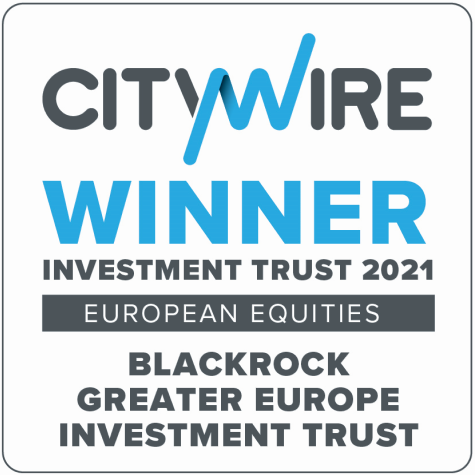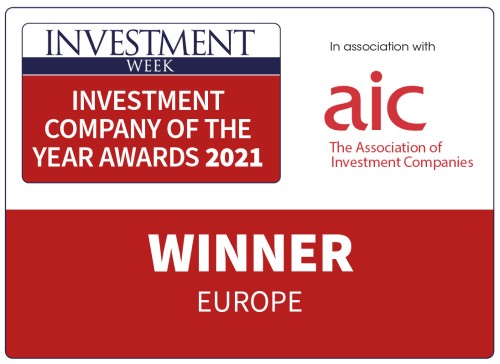About this investment trust
Capital at risk. The value of investments and the income from them can fall as well as rise and are not guaranteed. Investors may not get back the amount originally invested.
The Company aims to provide capital growth, primarily through investment in a focused portfolio constructed from a combination of the securities of large, mid and small capitalisation European companies, together with some investment in the developing markets of Europe.
Why choose it?
Europe is a rich source of innovation and dynamic capitalism. Active management can uncover its most exciting companies. The Trust invests in global brand leaders, plus smaller companies focused on niche, high growth areas. The Trust looks for high quality, well-capitalised companies with strong management teams that can create real value for shareholders over time.
Suited to…
This Trust is designed for investors looking to invest in a selection of Europe’s highest quality, fastest-growing companies, irrespective of their size and geography. They must be willing to take on some additional risk to grow their capital over the long term.
BlackRock Greater Europe Investment Trust FAQs
-
The BlackRock Greater Europe Investment Trust aims to achieve capital growth by investing in a focused portfolio of securities from large, mid and small capitalisation European companies, along with some investment in the developing markets of Europe. The experienced management team focuses on identifying high-quality firms with the potential for long-term value creation. The Trust is suited for investors seeking exposure to Europe’s dynamic and innovative companies, emphasising both global brand leaders and smaller companies in niche, high-growth areas.
-
Stefan Gries and Alexandra Dangoor are co-managers of BlackRock Greater Europe Investment Trust.
Stefan is Head of the European Equity team in BlackRock’s Portfolio Management Group, with extensive experience managing various European portfolios. Stefan is also co-manager on the European Absolute return (long/short) portfolios, as well as on Pan-European and Europe ex-UK long-only portfolios.
Alexandra joined the BlackRock Fundamentals European Equity Team in 2019. She also holds research responsibilities within the team’s financials research pod, focused on European banks and insurers.
-
Dividends from the BlackRock Greater Europe Investment Trust are declared and paid out semi-annually. Interim dividend payments are made in May with final dividend payments being made in December.
-
We believe there are reasons to be positive about European equities. Firstly, there’s valuation. We consider European stocks currently offer attractive value for investors looking to take advantage of the 2022 market fluctuations and tap into enduring trends, particularly the move towards a net-zero future.
Additionally, investing in European equities offers the benefit of targeting resilient companies poised to navigate inflation and economic slowdowns successfully. Emphasising dividends, with over 70% of European companies planning to reinstate or increase them, provides a key source of return. We seek mature, cash-generating companies with proven business models and strong financials across sectors, which present an attractive investment opportunity.
Europe hosts numerous top-tier companies, strategically positioned to support global governments in achieving their net-zero omissions objectives. Themes like infrastructure, automation, and the shift to electric vehicles are well represented in the BlackRock Greater Europe portfolio, making European equities an attractive prospect for long-term returns amid evolving market conditions.
-
The BlackRock Greater Europe Investment Trust provides an all-around solution for investing in large, mid and small-cap European businesses. The Trust taps into Europe’s innovation and dynamic capitalism, actively seeking out its most promising companies. With a portfolio including global brand leaders and smaller firms focusing on niche, high-growth areas, the Trust encompasses high-quality and well-capitalised companies with strong management, aiming to create lasting shareholder value. The BlackRock Greater Europe Investment Trust is suited to investors seeking exposure to Europe’s top-quality, fast-growing companies, regardless of size or location, and to those willing to take on additional risk for long-term capital growth.



Citywire: As at 16 November 2021.
Investment Week: As at 18 November 2021.
Kepler Rating: As at 1 January 2022.
What are the risks?
- Capital at risk. The value of investments and the income from them can fall as well as rise and are not guaranteed. Investors may not get back the amount originally invested.
- Overseas investment will be affected by movements in currency exchange rates.
- Emerging market investments are usually associated with higher investment risk than developed market investments. Therefore the value of these investments may be unpredictable and subject to greater variation.
- Investment strategies, such as borrowing, used by the Trust can result in even larger losses suffered when the value of the underlying investments fall.
- The Trust’s investments may have low liquidity which often causes the value of these investments to be less predictable. In extreme cases, the Trust may not be able to realise the investment at the latest market price or at a price considered fair.
Useful information
Capital at risk. The value of investments and the income from them can fall as well as rise and are not guaranteed. Investors may not get back the amount originally invested.
Fees & Charges
Annual Expenses as at Date: 31/08/2023
Ongoing Charge: 0.98%
Management Fee Summary: BlackRock receives an annual management fee of 0.85% per annum of the Company’s net asset value on assets up to £350 million and 0.75% per annum of net asset value on assets thereafter.
-
ISIN: GB00B01RDH75
Sedol: B01RDH7
Bloomberg: BRGE LN
Reuters: BRGE.L
LSE code: BRGE
-
Name of Company: BlackRock Fund Managers Limited
Telephone: 020 7743 3000
Email: cosec@blackrock.com
Website: www.blackrock.com/uk
Correspondence Address: Investor Services,
BlackRock Investment Management (UK) Limited,
12 Throgmorton Avenue,
London
EC2N 2DL
Name of Registrar: Computershare PLC
Registered Office: 12 Throgmorton Avenue,
London
EC2N 2DL
Registrar Telephone: +44 (0)370 707 1163
Place of Registration: England
Registered Number: 5142459
-
Year End: 31 August
Results Announced: April (half yearly), October (final)
AGM: November/December
Dividends Paid: May (interim), December (annual)
Latest company announcements
Capital at risk. The value of investments and the income from them can fall as well as rise and are not guaranteed. Investors may not get back the amount originally invested.
Filter by type:
Filter by date period:
Sign up for Regulatory News Service alerts
To receive email alert notifications once an update to the Trust occurs, please sign up and select the updates you would like to receive via The Association of Investment Companies website here.
The Board’s approach to ESG
Capital at risk. The value of investments and the income from them can fall as well as rise and are not guaranteed. Investors may not get back the amount originally invested.
The Board believes that responsible investment and sustainability are integral to the longer-term delivery of the Company’s success. The Board works closely with the Investment Manager to regularly review the Company’s performance, investment strategy and underlying policies to ensure that the Company’s investment objective continues to be met in an effective, responsible and sustainable way in the interests of shareholders and future investors.
Sustainable investing: BlackRock’s approach
Sustainability is BlackRock’s standard for investing, based on the investment conviction that integrating sustainability can help investors build more resilient portfolios and achieve better long term, risk-adjusted returns. BlackRock believes that climate change is a defining factor in companies’ long-term prospects and that it will have a significant and lasting impact on economic growth and prosperity. BlackRock believes that climate risk equates to investment risk and this will drive a profound reassessment of risk and asset values as investors seek to react to the impact of climate policy changes. This in turn is likely to drive a significant reallocation of capital away from traditional carbon intensive industries over the next decade.
ESG: integration into BlackRock’s investment management process
Environmental, Social and Governance (ESG) investing is often used interchangeably with the term “sustainable investing.” BlackRock has identified sustainable investing as being the overall framework and ESG as a data toolkit for identifying and informing our solutions. BlackRock has defined ESG Integration as the practice of incorporating material ESG information and consideration of sustainability risks into investment decisions in order to enhance risk-adjusted returns. BlackRock recognises the relevance of material ESG information across all asset classes and styles of portfolio management. ESG information and sustainability risks are included as a consideration in investment research, portfolio construction, portfolio review and investment stewardship processes. The Investment Manager considers ESG insights and data, including sustainability risks, within the total set of information in its research process and makes a determination as to the materiality of such information in its investment process. ESG insights are not the sole consideration when making investment decisions. The Investment Manager’s evaluation of ESG data may be subjective and could change over time in light of emerging sustainability risks or changing market conditions. This approach is consistent with the Investment Manager’s regulatory duty to manage the Company in accordance with its investment objective and policy and in the best interests of the Company’s investors. The Investment Manager’s Risk and Quantitative Analysis group will review portfolios to ensure that sustainability risks are considered regularly alongside traditional financial risks, that investment decisions are taken in light of relevant sustainability risks and that decisions exposing portfolios to sustainability risks are deliberate, and the risks diversified and scaled according to the investment objectives of the Company.
BlackRock’s approach to ESG integration is to broaden the total amount of information the Investment Manager considers with the aim of improving investment analysis and understanding the likely impact of sustainability risks on the Company’s investments. The Investment Manager assesses a variety of economic and financial indicators, which may include ESG data and insights, to make investment decisions appropriate for the Company objectives. This can include relevant third-party insights or data, internal research or engagement commentary and input from BlackRock Investment Stewardship.
ESG integration does not change the Company’s investment objective or constrain the Investment Manager’s investable universe and does not mean that an ESG investment strategy or exclusionary screens has been or will be adopted by the Company. Similarly, ESG integration does not determine the extent to which the Company may be impacted by sustainability risks.
Investment stewardship
BlackRock undertakes investment stewardship engagements and proxy voting with the goal of protecting and enhancing the long-term value of clients’ investments for relevant asset classes. In our experience, sustainable financial performance and value creation are enhanced by sound governance practices, including risk management oversight, board accountability and compliance with regulations. We focus on board composition, effectiveness and accountability as a top priority. In our experience, high standards of corporate governance are the foundations of board leadership and oversight. We engage to better understand how boards assess their effectiveness and performance, as well as their position on director responsibilities and commitments, turnover and succession planning, crisis management and diversity. For further details regarding BlackRock’s work on investment stewardship please refer to the website here.
Fund manager commentary
29 February 2024
Comments from the portfolio managers
Please note that the commentary below includes historic information in respect of performance data in respect of portfolio investments, index performance data and the Company’s NAV performance.
The figures shown relate to past performance. Past performance is not a reliable indicator of current or future results.
During the month, the Company’s net asset value (NAV) rose by 8.7% and the share price was up by 10.5%. For reference, the FTSE World Europe ex UK Index returned 2.7% during the period.
Robust corporate earnings combined with decent outlook statements and support from reasonably resilient macroeconomic data drove markets higher. Generally, this backdrop supported cyclical assets whilst defensives underperformed – although largely due to industry specific issues. Consumer discretionary, industrials and technology delivered the strongest performance in the market. Real estate, utilities, energy, and consumer staples fell in absolute terms.
Our constructive outlook remains intact as the consumer and corporate balance sheet remain strong, inflation is easing, and we are starting to get more evidence of parts of the economy turning. While there may be some areas of the market still working through pockets of weakness, we generally expect company messaging to be more positive on the 6–18-month view. Overall, we retain our core exposure to companies with predictable business models, higher than average returns on capital, strong cash flow conversions and opportunities to reinvest that cash flow into future growth projects at high incremental returns.
The Company outperformed its reference index during the month, driven by positive sector allocation and stock selection.
In sector terms, the Company particularly benefited from its higher weights in cyclical assets such as consumer discretionary, technology and industrials. A lower weight to utilities and energy aided relative returns as the sectors continued to suffer under collapsing gas prices. The portfolio’s underweight exposure to consumer staples was also positive as many companies within the sector, particularly within food and spirits, experienced weaker trading. Elsewhere, an underweight to telecoms and real estate aided active returns.
A number of the semiconductor names, including BESI, ASML and ASMi, were amongst the best performers having reported strong results themselves and also enjoying tailwinds from capex increases to fund the Artificial Intelligence infrastructure across the tech sector. Another set of strong results from US chip name NVIDIA also moved the industry higher. Our holding in BESI was the top performer over the month providing a strong attribution effect, with shares gaining nearly 20% in the month. The company reported Q4 results including a 7% beat on revenue and 18% beat on EBIT versus consensus expectations. Although their Q1 2024 guide came out below consensus, investors looked past the immediate term, focusing instead on positive comments around the speed of adoption for hybrid bonding which is a key long-term catalyst for earnings growth.
A solid contribution came from the consumer discretionary sector as the Company’s luxury names rebounded strongly after some pressure over the second half of 2023. Our position in Hermès contributed positively following strong quarterly results. Sales were up over 17% versus 14% consensus during Q4 and management hinted at strong momentum in 2024 so far.
Elsewhere in the sector, shares in LVMH continue to perform strongly on the back of better-than-expected results posted in January. Luxury sportscar maker Ferrari also once again impressed with strong results as the brand continues to see strong demand worldwide across models. Net revenues for 2023 came in at €6bn and cash flow remains strong. The order book is full giving investors earnings visibility out to 2026, whilst revenue from personalisation options is hitting record highs.
The portfolio’s health care positioning was supportive with positive attribution from holdings in Chemometec and Novo Nordisk, as well as from avoiding more defensive pharma names such as Roche. Chemometec reported encouraging results and outlook commentary. Despite market fears management reiterated guidance for 2024, noting an improving outlook and early signs of recovery in the cell and gene market. Recent calls with management and expert networks suggest demand for their products remains incredibly strong.
Shares in Adyen also rallied in the month gaining over 25%. The company posted H2 2023 results including a 10% beat on total payment volume and 7% beat on EBITDA versus consensus estimates. Management guided for margin improvement to continue in 2024.
A holding in DSV was the largest detractor. The company’s Q4 results included a 4% EBIT miss versus consensus driven by their Air and Sea division which was impacted by ‘other’ costs which some brokers flagged as IT related. The leadership change announced last year also went into effect during the month with the former COO stepping into the CEO role. Finally, speculation around a potential large M&A deal ramped up again following the CFO’s presentation on their conference call which included similar buy-back and treasury management strategies seen carried out preceding previous deals.
Outlook
We remain fairly constructive on European equities as the set-up should be positive: inflation is on a downwards trajectory and the economy appears relatively robust. Eurozone inflation figures have fallen and whilst there may be volatility in month-to-month data, the economy can handle these levels of inflation. This also means that we have come to, or are close to, peak rates and at some point it is fair to assume interest rates will come down. We have already started to see a positive impact on falling mortgage rates in many European countries.
The corporate sector in Europe is healthy. There is limited corporate debt, margins are strong, there is no need for major layoffs and the end of destocking across most industries is in sight. This in turn is good news for the consumer: a supply chain and energy crisis that is largely done, combined with high employment numbers and falling inflation, suggest that the cost-of-living crisis has cooled off. This puts the region in a much better position compared to a year ago.
Nevertheless, the asset class has been under-owned ever since the Russian invasion of Ukraine in February 2022. As always in Europe, it is key to remain selective. Assessing the economy from the bottom-up can uncover areas for greater optimism than traditional economic indicators may suggest. Our regular contact with management teams helps us understand whether the direction of earnings and cashflows on a medium to long-term view for the companies in our portfolio remains on track.
Long-term structural trends and large amounts of fiscal spending via the Recovery fund, Green Deal and the REPowerEU plan in Europe can also drive demand for years to come, for example in areas such as infrastructure, automation, innovation in medicines, the shift to electric vehicles, digitization, or decarbonisation.
Valuations are attractive versus history and especially versus US equities. Overall, evidence of a resilient consumer, healthy corporate sector and decent outlooks underpinned by green stimulus, give us confidence that many of the companies in our portfolio can continue to weather the storm.
Unless otherwise stated all data is sourced from BlackRock as of 31 December 2023.
Any opinions or forecasts represent an assessment of the market environment at a specific time and is not intended to be a forecast of future events or a guarantee of future results.
This information should not be relied upon by the reader as research, investment advice or a recommendation.
Risk: Reference to the names of each company in this communication is merely for explaining the investment strategy, and should not be construed as investment advice or investment recommendation of those companies.
Portfolio manager biography
Capital at risk. The value of investments and the income from them can fall as well as rise and are not guaranteed. Investors may not get back the amount originally invested.
Stefan Gries is co-manager of BlackRock Greater Europe Investment Trust plc. He is head of the European Equity team within the Fundamental Equity division of BlackRock’s Portfolio Management Group. He is co-manager on the European Absolute return (long/short) portfolios, as well as on Pan European and Europe ex UK long-only portfolios. Prior to joining BlackRock in 2008, Stefan spent two years at Scottish Widows Investment Partnership where he completed a two-year graduate programme. Since joining BlackRock, he has worked both as a portfolio manager and as an analyst covering, at various times, energy, pharmaceuticals and insurance on behalf of the European Equity team. He earned an MA in economics and Spanish from the University of St. Andrews in 2005.
Alexandra Dangoor is co-manager of BlackRock Greater Europe Investment Trust plc. Alexandra also has research responsibilities within the team’s financials research pod focused on the European banks and insurers. Alexandra joined the BlackRock Fundamental European Equity Team in 2019 after two years on BlackRock’s graduate rotation programme, where she was an analyst in the Natural Resources and European Equity teams. Alexandra earned a BSc degree in Mathematics and Economics at Bristol University, graduating in 2015, and an MSc in Investment and Wealth Management at Imperial College Business School, graduating in 2016.
Board of directors
All the Directors are non-executive and independent of the Investment Manager. The Board as a whole constitutes the Audit and Management Engagement Committee.
Eric Sanderson (appointed April 2013) (Chairman) is a chartered accountant and a banker and was chief executive of British Linen Bank from 1989 to 1997 and a member of the management board of Bank of Scotland in his role as head of group treasury operations from 1997 to 1999. He was formerly chairman of MyTravel Group PLC, MWB Group Holdings, Dunedin Fund Managers Limited and Schroder UK Mid Cap Fund plc. He is presently chairman of JPMorgan Emerging Europe, Middle East & Africa Securities Limited.
Peter Baxter (appointed April 2015) has over 30 years’ experience in the investment management industry. He is an executive director of Snowball Impact Management Ltd, a social impact investment organisation, a non-executive director of Civitas Social Housing plc, and a trustee of Trust for London, and was a member of the Financial Reporting Council’s Conduct Committee. Previously he was chief executive of Old Mutual Asset Managers (UK) Ltd and worked for Schroders and Hill Samuel in a variety of investment roles.
Paola Subacchi (appointed July 2017) (Senior Independent Director) is an economist, writer and commentator on the functioning and governance of the international financial and monetary system. She is Professor of International Economics and Chair of the Advisory Board, Global Policy Institute, Queen Mary University of London, visiting professor at the University of Bologna, non-executive director of Scottish Mortgage Investment Trust PLC as well as Founder of Essential Economics Ltd. She writes regularly on Project Syndicate.
Ian Sayers (appointed February 2022) (Chairman of the Audit and Management Engagement Committee) is the former Chief Executive of the Association of Investment Companies (AIC), which he became in 2010 on his promotion from Deputy Director General. Prior to that, he was the AIC’s Technical Director, advising members on areas such as taxation, accounting, company law and regulation, as well as having a key role in its public affairs activity. He qualified as a chartered accountant and chartered tax advisor.
Sapna Shah (appointed 12 December 2023) has 20 years of investment banking experience advising UK companies, including listed REITs and investment companies, on IPOs, equity capital market transactions and mergers and acquisitions. She is a non-executive director of The Association of Investment Companies and a consultant at Panmure Gordon Limited. Prior to this she held senior investment banking roles at UBS AG, Oriel Securities (now Stifel Nicolaus Europe) and Cenkos Securities. She is currently a non-executive director of Supermarket Income REIT plc and BioPharma Credit PLC.






